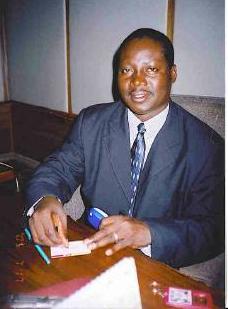Posted by africanpress on May 16, 2008
By Leo Odera Omolo and Eng. Jerry Baraza
Problem statement: Migori is a town in southern Kenya with a population of about 5,000 people. The majority of the town inhabitants are small scale traders with an average income of about 100 dollars per month.
The town has a water borehole with very limited distribution. The water is supplied by the ministry of water development in Migori. It is only serving the government offices and staff quarters, the hospital and the teachers college.
The borehole does not have enough capacity to supply every estate with water. Majority of the town dwellers have no water in the residential houses, schools, church missions, restaurants, hotels etc. The town has no sewerage system.
The people therefore use dirty water collected from Migori River and streams near the town for cooking and drinking. There are very many pit latrines in the town resulting in pollution of shallow wells dug in the residential and business areas.
This results in many diseases occurring in the population such as cholera, diarrhea, and typhoid among others. There is a big river flowing through the town-Migori river. There is electricity supply in the town center but not in the estates.
Sustainable Solutions: Engineers without Borders Kenya chapter is in the process of conducting a feasibility study for a sustainable Water supply and Sanitation system in Migori town. The objective of the feasibility study is to come up with a water supply and sanitation project that can take care of the Migori town and its environs.
This project will be designed, funded and implemented by engineering students from USA with their counterparts from Public Universities in Kenya as part of their study for an engineering degree..
This project envisages supply of water to collection kiosks in the estates and town from where the citizens can collect clean water into their houses throughout the Migori Municipality.
A sewerage system shall also be constructed at the same time to avoid contamination of ground water system by pit latrines. Each water consumer shall be required to plant one tree seedling every week in their gardens to improve water catchments and the environment.
Science at Work: Engineer Baraza says that the students will design a system that will tap the Migori River and treat the water before storing and supplying the same to commercial shops, hotels, offices, schools, homes and churches in the area. It is also foreseen that a new borehole shall be drilled in the town to supply water during the dry spell as well as rain water harvesting system. The project is expected to start in 2009 and will be finished before 2012.
Multi-stakeholder cooperation: Engineers without Borders shall work in this project with the District water Engineer, Town Planner, Municipal Council and Urban Council as one team.
The citizens of the town will also be required to contribute manual labor for digging trenches for water pipes and to provide some materials for constructing water Kiosks in the Estates. A committee called “Migori Water and Sewerage Development Committee” shall be formed to facilitate the planning and implementation of this project. Its membership shall be constituted democratically from all stake holders.
The man behind this project is none other than Eng. Jerry Baraza who is a Senior lecturer at Kenyatta University and The Executive Director of Engineers without Borders in Kenya. Eng. Baraza is also a friend of the citizens from Migori and is member of Paris Club.

